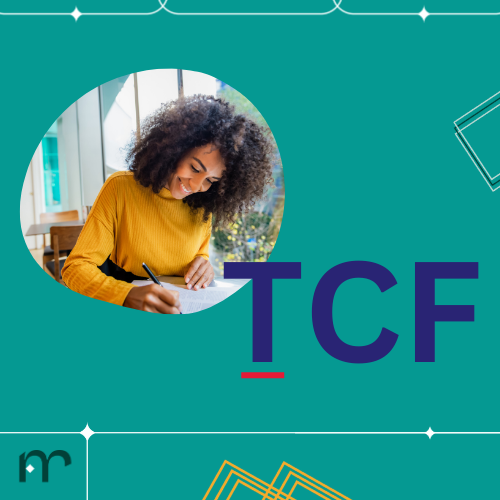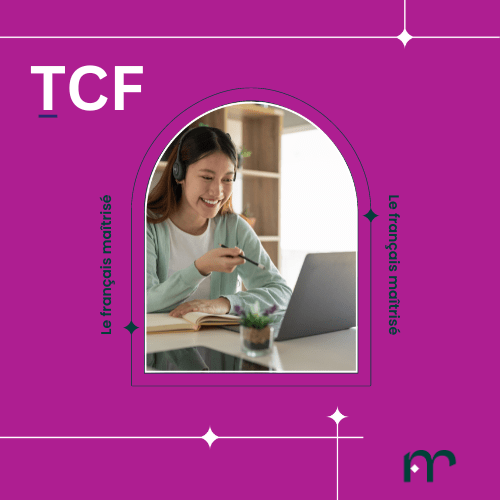What is the TCF exam?
posted the 13/08/2024
General Presentation Of The Exam
The TCF exam (Test de connaissance du français) is a French language test intended to be taken by non-native French speakers to measure their proficiency of the French language according to the Common European Framework of Reference for Languages, which assigns a letter score from A1 to C2 on each language competency. This exam is offered by the French Ministry of National Education, Higher Education, and Research.
The TCF exam serves several practical benefits, depending on the objective of the person wishing to take it. There are different types of TCF exams, each suited for a specific purpose.
• TCF exam for Integration, Residence and nationality is intended for persons who wish to prove their French language capabilities to obtain French citizenship.
• TCF exam Canada is intended for persons who wish to prove their French language capabilities to obtain permanent residency in Canada, outside the province of Quebec.
• TCF exam Quebec is intended for persons who wish to prove their French language capabilities to obtain permanent residency within the province of Quebec in Canada.
• TCF DAP exam is intended for persons who wish to prove their French language capabilities to enroll in the first year of a bachelor’s degree in France.
• TCF exam for professional or academic purposes is a general TCF exam intended for persons who wish to prove their French language capabilities to enhance their career or academic prospects in domains which require French speaking skills.
The TCF exam is valid for 2 years from the test result date. It is important to make sure that your test results are valid when attempting to use them, especially for situations such as immigration, where test result validity is taken very seriously when applying. For example, if you are using your TCF Canada results in order to obtain Permanent Residency in Canada, you need to make sure that your test result validity has not expired by the time you submit your documents to Immigration, Refugees and Citizenship Canada.
TCF exam format
The TCF exam has several sections that test different language competencies. In general, it is divided into a Compulsory section and an Optional section, even though the modules you will have to take can vary depending on what you’re using the exam for. We will go more in-depth into that later on, but for now, here are the modules divided between the Compulsory and Optional sections:
Compulsory
• Listening: The listening section tests the person’s ability to understand spoken French in various real-life situations. The questions are in increasing order of difficulty. During this section, you will be listening to casual conversations between two or more individuals, phone calls, job interviews, as well as excerpts from real-life French media such as short news segments and radio interviews with celebrities. It is important to note that questions targeting levels A1 to B1 make use of recordings specifically made for test takers, while questions targeting levels B2 and above contain real-life excerpts from French media. The questions are in multiple choice format, and each question has 4 possible answers, out of which only 1 is correct. The questions are not written on the exam paper, so you will have to listen to the question after the recording is played, and each recording is played only once.
 • Reading: The reading section tests the person’s ability to understand written French by being presented with a wide array of different texts, in increasing order of difficulty. You will be presented with informal written correspondence such as text messages and formal written correspondence such as work e-mails, as well as different advertisements, brochures, and restaurant menus. As the questions increase in complexity, you will be presented with longer texts about everyday topics in an informal tone, as well as longer articles and reports where the author takes a stance on specific or abstract topics. With questions tackling higher levels (C1, C2), you will be presented with long and complex academic and/or literary texts, where you will be asked more nuanced questions that require a full-rounded understanding of the language and subtle tones in writing. Like the previous section, the questions are in multiple-choice format, with 4 possible answers and only 1 correct answer.
• Reading: The reading section tests the person’s ability to understand written French by being presented with a wide array of different texts, in increasing order of difficulty. You will be presented with informal written correspondence such as text messages and formal written correspondence such as work e-mails, as well as different advertisements, brochures, and restaurant menus. As the questions increase in complexity, you will be presented with longer texts about everyday topics in an informal tone, as well as longer articles and reports where the author takes a stance on specific or abstract topics. With questions tackling higher levels (C1, C2), you will be presented with long and complex academic and/or literary texts, where you will be asked more nuanced questions that require a full-rounded understanding of the language and subtle tones in writing. Like the previous section, the questions are in multiple-choice format, with 4 possible answers and only 1 correct answer.
• Use of Language Structures: This section will test the person’s understanding of French grammar, from simple grammar concepts like tenses to more complex questions regarding nuanced grammatical rules such as the usage of the subjunctive form. Like the previous sections, the questions in this section progress through increasing level of difficulty, with each question being more difficult than the previous one.
Optional:
• Speaking: The speaking section tests the person’s ability to engage in conversations with a native French speaker In the French language. It is divided into 3 tasks, which are as follows:
• Directed interview without preparation time:
During this task, the examinator will test the candidate’s ability to talk about themselves, by introducing themselves, talking about where they are from, and describing their hobbies. This is the shortest task of this section and will not last longer than 2 minutes.
• Interaction exercise with preparation:
During this task, the examinator will test the candidate’s ability to obtain information regarding everyday circumstances, such as asking for more information regarding a job posting or asking tips from a friend regarding the best places to go to for a summer vacation in Europe. The examinator and the candidate will roleplay as someone asking for information (the candidate) and someone providing the information (the examinator). The candidate will be given the topic and will have 2 minutes to prepare questions to ask. Once the preparation time is up, the candidate will have about 3 minutes and 30 seconds to obtain information from the examinator.
• Expression of a point of view without preparation:
During this task, the candidate will be tested on their ability to express their point of view on an abstract topic in a structured and convenient manner. The candidate will have no preparation time for this task, and is expected to spontaneously react to interjections and opposing points of view presented by the examinator, in order to test the candidate’s comfort in utilizing the language in a spontaneous way.
• Writing: The writing section tests the candidate’s ability to express themselves through writing in the French language. Like the Speaking section, it is divided into 3 tasks, which are as follows:
• Writing a short letter/message:
In this task, the candidate is tested on their ability to write a short and concise message to one or several recipients. The topics in this task are not complex and involve simple ideas such as inviting a friend over for vacation or asking them to come and pet sit your cat. The minimum number of words you should write is 60, and the maximum is 120.
• Writing an article or a blog post:
In this task, the candidate is tested on their ability to write an article or a blogpost talking about a specified experience they had, such as a birthday party or a vacation. The candidate is expected to eloquently describe this experience and provide details. The minimum number of words allowed for this task is 120 and the maximum is 150.
• Writing an argumentative essay:
In this task, the candidate is tested on their ability to write an essay that tackles 2 opposing point of views that are provided to the candidate in the form of 2 short articles. In the first part of the essay, the candidate should summarize the two articles in their own words (in 40 to 60 words), and in the second part, they should give their opinion on the common theme of the 2 articles and back it up with examples (in 80 to 120 words).
Which sections are compulsory to take for each variation of the TCF exam?
As we mentioned earlier, there are different variations of the TCF exam depending on the candidate’s objectives. Each of these variations have a different set of compulsory sections that must be taken by the candidate. We will now briefly go through the different variations of the exam and the compulsory sections for each one.
• TCF – Integration, Residence, and Nationality:
The mandatory sections that must be taken for this exam are:
• Listening comprehension (29 questions, 25 minutes)
• Oral expression (12 minutes, 3 tasks)
The minimum level required to obtain a French residence permit is an A2, and the minimum requirement to obtain French nationality is a B1.
• TCF Canada:
The mandatory sections that must be taken for this exam are:
• Listening comprehension (29 questions, 25 minutes)
• Reading comprehension (29 questions, 45 minutes)
• Oral expression (12 minutes, 3 tasks)
• Written expression (1 hour, 2 tasks)
The higher the candidate scores on each section, the more points they will gain for immigrating into Canada. If the candidate achieves a high B2 level (a CLB 7) on each section, they will receive an additional 50 points for their Express Entry application and be eligible for French Language Proficiency Express Entry draws.
• TCF Quebec:
The mandatory sections that must be taken for this exam are:
• Listening comprehension (29 questions, 25 minutes)
• Oral expression (12 minutes, 3 tasks)
The candidate is required to achieve a minimum overall level of B2 in order to obtain residency in Quebec.
• TCF DAP:
The mandatory sections that must be taken for this exam are:
• Listening comprehension (29 questions, 25 minutes)
• Command of lexical and grammatical structures (18 questions, 15 minutes)
• Reading Comprehension (29 questions, 45 minutes)
• Written Expression (1 hour, 3 tasks)
• TCF Tout Public:
The mandatory sections that must be taken for this exam are:
• Listening comprehension (29 questions, 25 minutes)
• Reading Comprehension (29 questions, 45 minutes)
Although the Speaking and Writing sections are optional for this TCF exam, many institutions might still require all skills to be tested.
Tips and Tricks for each section of the TCF Exam
Listening:
The Listening section of the TCF exam is usually the section candidates struggle with the most, since you only get one shot at listening to the audio recordings and the questions, and you must select your answer in a very short period of time before having to listen to the next recording and question. In order to make sure you are well-prepared for this section, it is important to:
• Diversify your listening sources by exposing yourself to different types of accents, speed and types of speakers. The TCF exam will have a wide range of different types of audio from traditional Francophone media, so regularly listening to podcasts and news and interviews in French will accustom you to the type of audio recordings you will come across in this section.
• Simulate real-life test conditions by putting a timer and attempting to answer practice questions within the time-constraints that reflect the constraints of the actual exam. This will help you practice listening efficiently and training yourself to not be intimidated by the limited time you have during the exam.
• During the exam itself, it is important to keep a clear mind by staying calm and focused, without being distracted by what is going on around you. It is essential to not miss anything while listening and to have a clear idea of the main idea of each audio recording. Remember that you won't know what the question is going to be until the very end of the recording, but by being aware of the main idea of the recording itself, you will not be caught off-guard when you listen to the question and the proposed answers.
Reading:
The Reading section of the TCF exam requires careful reading and comprehension skills. It is less stressful than the Listening section, since you will have more control of the material you are consuming in order to answer the questions, and you will have the opportunity to review your answers. In order to make sure you do your best in this section, it is important to:
• Try to read the questions before starting to read the passage, so you will have a better idea of the information you must look for while reading the texts presented. This can help you read more efficiently and save time.
• Pay attention to detail, since some questions, especially the later ones, may require you to pick up on subtle details that might not be readily apparent to you at the first read.
• Train yourself to rely on context clues that can help you understand the meaning of unfamiliar words. If you struggle with understanding certain keywords, the surrounding sentences can usually provide hints regarding what the word means.
• Reading a wide variety of French texts, such as news articles, opinion articles, essays and short stories, to enhance your lexical knowledge of the language. The more content you consume, the more vocabulary you will be exposed to which will help you be more prepared during the exam.
Command of lexical and grammatical structures
For this section, it is important to have a strong foundation in French grammar and sentence structures to be able to comfortably answer all the questions. To do your best, on this section, it is important to:
• Review common mistakes that are made in the French language, since this section will usually test your knowledge on a variety of common French sentence structures. The more common mistakes you practice, the more likely you are of answering the questions correctly.
• Practice identifying certain synonyms and antonyms for common words in French, which will not only improve your vocabulary, but make you able to understand the nuances of lexical structures which will be tested in this section.
• Familiarize yourself with common idiomatic French expressions and phrases, since these expressions will be tested in this section.
Writing:
For this section, it is important to be comfortable in expressing yourself through writing in the French language. To make sure you are able to do your best in this section, it is important to:
• Understand the task requirements and adapt your writing style in accordance with the requirement of the task. For example, you must be able to write in a formal and academic tone for the task that asks you to write an argumentative essay, and to write in a more informal and familiar tone for the task that asks you to write a short letter to your close friend. This will showcase your capability of using your writing skills in a flexible and targeted way, which is essential for this task,
• Plan the main ideas and the structure of your writing before starting to write it. Outlining your text will help bring structure and intentionality in what you are writing and will help you organize your ideas in a logical and coherent manner, which will improve your writing score.
• Try to demonstrate a rich vocabulary by avoiding repeating the same words excessively, opting to use synonyms instead, which will add a lexical richness to your text which will give you a higher mark.
Speaking:
The speaking section is another usually stressful part for many candidates who are planning to take the TCF exam. This section will test your ability to express yourself verbally in French. To make sure you are able to do your best in this section, it is important to:
• Practice as much as possible beforehand by mimicing the conditions of the TCF exam with a teacher or a friend who is aware of the structure of this section. This section is quite consistent, with the same types of questions being asked, so the more practice you do, the more familiar you will be with the questions and you will not be caught off-guard.
• Record yourself speaking in French and responding to common Speakin section tasks which will allow you to identify areas of improvement when it comes to your pronunciation, intonation and fluency.
• Try to enhance the flow of your speech by using connectors and transitions between your sentences. This will make your spoken responses sound more cohesive and impress the examinator with the richness of your command of the language . It's also alright to take a moment or two to collect your thoughts before you give an answer, if it will help you give a more coherent and well-put response.
